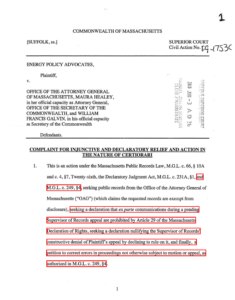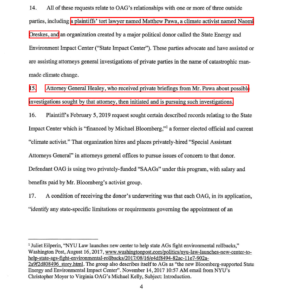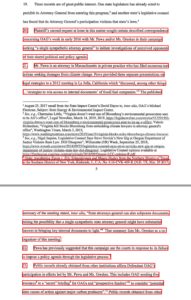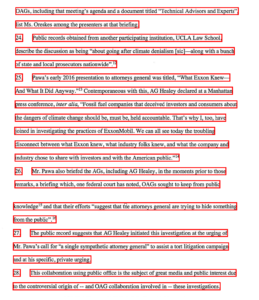Amended Complaint Filed Against Massachusetts Attorney General After ‘Massachusetts Miracle’
CLW has reported that Massachusetts Attorney General Maura Healey’s office took in a January 2016 slide show from tort lawyer Matt Pawa titled “What Exxon Knew”, recruiting “a single sympathetic attorney general” to investigate the target of his tort litigation and start subpoenaing records; then in March she announced an investigation into — wait for it — “What Exxon Knew“. When the transparency group Energy Policy Advocates sought the OAG/Pawa correspondence, Team Healey said releasing even the To, From and Date of the emails, let alone the content, threatened to derail its Exxon investigation.
The phrase “proves too much” comes to mind. Be that as it may, as the hour neared to answer EPA’s lawsuit neared, OAG decided that ominous threat of releasing the emails was outweighed by…something, and turned them over. The ones it claimed were exempt, every word of every page, and could ruin her investigation and possible future enforcement actions.
CLW confirms upon review that these emails are not protected by any privilege and plainly should have been released without requiring litigation. Given the the eleventh-hour release, and how those OAG claims and stonewall are hard to square with it suddenly releasing the records, it is not unreasonable to wonder if this change of heart had anything to do with a desire to avoid answering EPA’s highly specific and, as you’ll see, damning factual allegations before a court.
Nonetheless, given this turnabout, EPA through counsel Government Accountability & Oversight and local counsel Tim Cornell has filed an amended complaint. It seems Healey’s office continues to withhold redacted portions of its correspondence with the Bloomberg Center created to place — two in MA OAG, in fact — a handful of which EPA disputes are valid withholdings.
A sampling is below. The red lines indicate those portions that this Massachusetts Miracle overtook with events (CLW understands ¶28 was not in fact withdrawn). They also nicely draw the reader’s attention to what, arguably, the Massachusetts Office of Attorney General was concerned about admitting or denying to a court. Given the gravity of what seems quite clearly to have transpired in this use of law enforcement, CLW doubts that was the last opportunity to air these developments.




